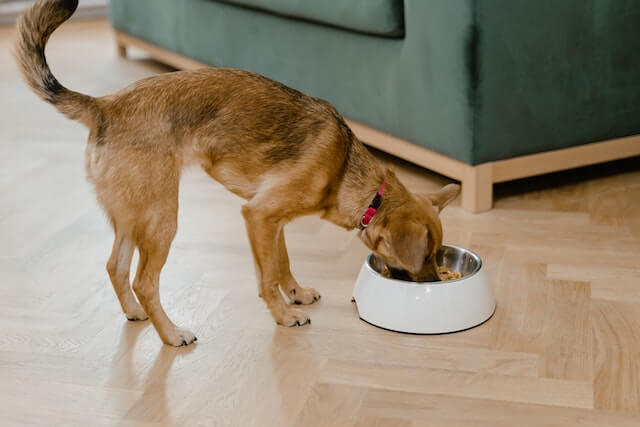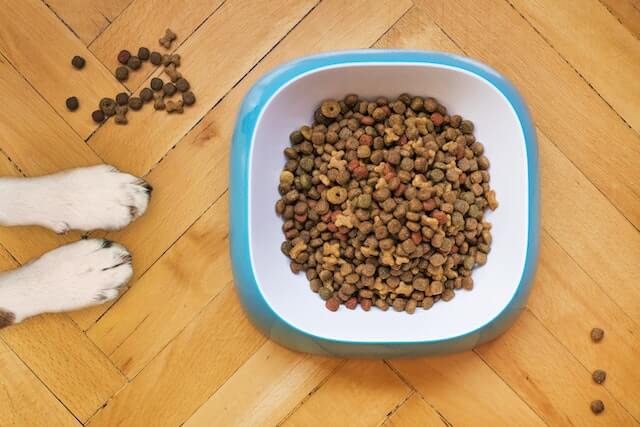Feeding Your Dog the Right Diet for a Sensitive Stomach
Does your pup suffer from an upset stomach, gas, or diarrhea? If so, they could need a sensitive stomach diet. While it may seem like a daunting task to switch up their regular diet, feeding your dog the right food can make all the difference. We’ll discuss why dogs with sensitive stomachs should be fed a special sensitive stomach diet and what benefits come with it.
What is a Sensitive Stomach Diet?
A sensitive stomach diet is specifically formulated for pups who have digestive problems. It typically contains fewer ingredients than regular dog food and excludes common allergens such as wheat, corn, soy, dairy products, and artificial preservatives. If you notice that your pup has frequent upset stomachs or experiences diarrhea frequently after eating certain foods, then switching to a sensitive stomach diet is something to consider.
The Benefits of Feeding Your Dog a Sensitive Stomach Diet
There are many benefits to feeding your pup a sensitive stomach diet. First and foremost, it helps to reduce digestive issues by eliminating potential triggers that could lead to an upset tummy. This type of food also tends to contain more natural ingredients which can improve your dog’s overall health and boost its immune system. Additionally, these diets often contain added probiotics which help promote healthy gut bacteria and aid in digestion. Finally, feeding your dog this type of food can help them maintain their ideal weight since some formulas are lower in fat content than traditional diets.
Choosing the Right Diet
When shopping for a sensitive stomach diet for your pup it’s important to look for one that has been formulated specifically for dogs with digestive issues like yours. You should also make sure it meets all the nutritional requirements outlined by AAFCO (The Association Of American Feed Control Officials). Additionally, if your pup has any allergies or sensitivities be sure to check the ingredients list carefully before making a purchase.
When it comes to taking care of our furry friends’ health needs, making sure that they get the right nutrition is essential. For pups with sensitive stomachs or digestive issues, switching to a sensitive stomachs diet can make all the difference in keeping them happy and healthy. Not only does this type of food help reduce digestive issues but it also contains more natural ingredients that are beneficial for overall health and even promote weight maintenance! So if you suspect that your pup may benefit from switching up their diet, consider giving them one specifically designed for dogs with sensitive tummies!

Finding the Perfect Dog Food for Sensitive Stomach Diet
Does your pup suffer from an upset stomach? If so, you’ve probably noticed that finding the right food for them can be a challenge. But don’t worry—by understanding what to look for in dog food and doing your research, you can give your pup a balanced diet with fewer negative reactions. Here’s what to consider when choosing dog food for sensitive stomach diet.
Ingredients
When selecting food, it’s important to pay attention to the ingredients list. Look out for foods with proteins like lamb or whitefish as these are often more easily digested than beef or pork. Additionally, make sure there are no artificial fillers, preservatives, or other additives that could potentially cause an allergic reaction in your pup. Also be aware of any grains and carbohydrates like corn, wheat, or soy—these can trigger digestive issues in dogs prone to sensitivities.
Ingredients to Avoid
When shopping for dog food, it is important to pay attention to the ingredients list. Many commercial brands include fillers or artificial ingredients that may not be suitable for dogs with sensitive stomachs. Some of the ingredients that you should avoid include wheat, corn, soy, and by-products like animal fat and bone meal. Also, check the label to make sure there are no preservatives or artificial colors added.
High-Quality Protein Sources
When looking at what type of protein is used in the food, try to stick with lean proteins such as chicken, fish, and turkey. Also, look out for sources such as eggs and dairy products like yogurt that provide essential nutrients without adding unnecessary fat or calories. Additionally, make sure that these proteins are from high-quality sources so that you know they are safe and nutritious for your pup’s sensitive stomach.
Fiber Content
Another important factor when considering dog food for sensitive stomach diet is its fiber content. Fiber helps regulate digestion and helps keep your pup’s digestive system running smoothly. Look out for foods with high fiber content such as oats, barley, sweet potatoes, pumpkin puree, etc., as these will help keep your pup’s digestive system healthy and running efficiently.
Nutrition
It’s also important to keep nutrition in mind when selecting dog food. Look for foods that provide a good balance of protein, fat, and carbohydrates as well as vitamins and minerals that are essential for your pup’s health. Be mindful of labels that claim “complete and balanced nutrition” but don’t provide any nutritional information—these may not have been tested by regulatory agencies like the AAFCO (Association of American Feed Control Officials).
Quality Assurances
Finally, look out for quality assurances from the manufacturer—it’s always best if they have had their food approved by regulatory agencies like the AAFCO or FEDIAF (Federation of European Pet Food Industries). This indicates that their product has undergone rigorous testing and is safe and nutritious enough for consumption regularly.
Finding the perfect dog food is no small feat! But thankfully by understanding what ingredients to look out for and researching quality assurance certifications from regulatory agencies like the AAFCO or FEDIAF, you can ensure that your pup is getting all the nutrients they need without any potential triggers that could cause an upset stomach. For pet owners who want peace of mind about their pup’s well-being, taking this extra step is worth it!

Finding the Perfect Sensitive Stomach Dog Food for Your Furry Friend
Does your pup suffer from an upset stomach? If so, you’re probably searching for dog food that won’t aggravate their sensitive stomach. But with so many options available, it can be hard to know where to start. Learn more about different types of sensitive stomach dog foods and what to look for when selecting the right one for your pup.
Types of Sensitive Stomach Dog Foods
There are several types of sensitive stomach diets available on the market today, each offering its unique benefits. Some popular choices include hypoallergenic dog food, limited ingredient diets (LIDs), and gastrointestinal formulas. Let’s take a closer look at each one.
Hypoallergenic Dog Foods
These special formulations are designed to reduce the risk of allergic reactions in dogs with sensitivities or allergies to certain ingredients. Most hypoallergenic dog foods contain novel proteins such as duck or rabbit instead of common proteins like beef or chicken. They also contain limited amounts of grains and other fillers, which can help reduce digestive issues related to allergies and intolerances.
Limited Ingredient Diets (LIDs)
LIDs are great options for dogs with sensitive stomachs because they feature high-quality proteins and digestible carbohydrates like potatoes or peas while avoiding common pet food ingredients that may cause gastrointestinal discomforts such as corn, wheat, soy, dairy products, and artificial colors or preservatives. Many LID brands also offer grain-free alternatives that use potato or tapioca starch in place of grains.
Gastrointestinal Formulas: Gastrointestinal formulas are specially designed to help support your canine companion’s delicate digestive system by providing highly digestible proteins, decreased fat levels, increased levels of soluble fiber from sources like pumpkin or sweet potato puree, prebiotics to promote healthy bacteria growth in the gut, and added probiotics for improved digestion and absorption of nutrients. Plus, these formulas often come in tasty recipes made with real meat ingredients that dogs love!
When choosing a sensitive stomach diet for your furry friend, it’s important to do some research into the different types available so you can make an informed decision based on their individual needs. Hypoallergenic foods are great options if your pup has allergies or sensitivities; limited ingredient diets can help reduce digestive issues related to common pet food ingredients; and gastrointestinal formulas provide additional support for their delicate digestive system. With all these choices available, you can find just the right formula for your four-legged companion!

Why a Sensitive Stomach Diet is the Best Choice For Your Dog
Keeping your pup happy and healthy is always a priority. But when dealing with digestive issues or other stomach-related problems, it can be hard to know what’s best for them. That’s why feeding your pup a sensitive stomach diet can be beneficial for their overall health and well-being. Let’s explore the benefits of choosing this type of food for your furry friend.
Easy on the Digestive System
A sensitive stomach diet is specifically designed for dogs that have trouble digesting their regular food. It helps relieve digestive issues like vomiting, diarrhea, and gas by reducing inflammation in the intestines. Foods that are high in fiber help to bulk up a stool while promoting a healthy gut microbiome. This can reduce any discomfort your pup may feel due to an upset stomach or indigestion. Plus, these foods are low in fat which makes them easier to digest compared to more traditional options.
Promotes Healthy Weight
A sensitive stomach diet is often lower in calories than regular dog food, which makes it a great choice if you’re looking to help your dog maintain a healthy weight. This type of diet also contains essential nutrients like vitamins, minerals, and proteins that help support all aspects of health—not just digestion. So if you want to help keep your pup at an ideal weight without sacrificing nutrition, then this might be the perfect option for you both!
Reduces Allergens & Intolerances
Another benefit of choosing a sensitive stomach diet is that it eliminates certain allergens and intolerances from the equation. Many regular dog foods contain ingredients like wheat or corn which can trigger allergies or food intolerances in some breeds—especially if they’re prone to having sensitive stomachs anyway! By opting for an all-natural alternative with fewer ingredients, you can reduce these risks significantly while still providing your pup with all the nutrition they need and deserve.
A sensitive stomach diet offers many benefits for both you and your pup! It helps promote easy digestion while reducing potential allergens and intolerances along with maintaining healthy weight levels thanks to its lower calorie content. Plus, it provides essential vitamins and minerals necessary for overall health too! So if you’re looking for an all-in-one solution that will benefit both you and your dog, then this could be a perfect choice! Try out some different meals today so you can find one that works best for both of you!

Maximizing the Benefits of a Sensitive-Stomach Diet for Your Dog
If you have a dog that suffers from sensitive stomach issues, then you know how important it is to feed them a diet specifically tailored to their needs. But simply giving your pup the right food isn’t enough; to truly maximize the benefits of a sensitive-stomach diet for your dog, there are some additional steps you can take. Let’s break down what those are.
Consult Your Vet Regularly
A good place to start is by consulting your vet regularly about what type of food should be given and how much of it should be consumed. Together, you can come up with an individualized plan for your pup that best suits their specific needs. This plan should include dietary recommendations, as well as any supplements or medications that might be needed to help them feel better.
Choose High-Quality Ingredients
When it comes to choosing ingredients for your pup’s sensitive-stomach diet, opt for high-quality options whenever possible. Stick with whole foods and avoid processed items such as canned wet dog food or kibble. Look for organic options if available and make sure that all ingredients are free of fillers and artificial additives—these can cause further digestive upset in some dogs. Quality ingredients may cost more but they will provide greater nutritional value and help promote overall gut health in your pup.
Reduce Stressful Situations
It’s not just food that affects your pup’s stomach; stress can also play a major role. To keep stress levels down, make sure that your pup is getting plenty of exercises, mental stimulation, and socialization with other animals and humans alike regularly. Additionally, try to avoid bringing new items into the house too quickly; introduce them slowly so that your pup has time to adjust and become comfortable with them before trying out something else new. These simple steps will go a long way toward helping reduce any potential stressors that could cause further digestive upset in the future.
Feeding your pup the right type of food has tremendous benefits when it comes to managing sensitive stomach diet—but it’s only one piece of the puzzle! By taking into account factors like quality ingredients, vet consultation, and reducing stressful situations you’ll be able to maximize the benefits of a sensitive-stomach diet for your dog and make sure they stay healthy and happy for years to come!






